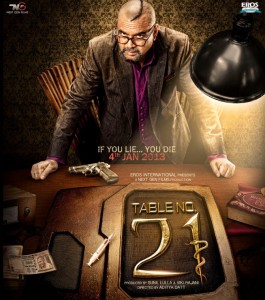Aditya Datt (Will You Marry Me?, Goodluck, Dil Diya Hai & Aashiq Banaya Aapne) returns to the screens once again trying to impress us. He has a unique trio as a cast and a intriguing concept in hand also. Does he deliver finally? Read on to find out.
The movie starts off with Vivaan (Rajeev Khandelwal) and Siya (Tena Desae) heading off for a holiday in Fiji which they’ve won in a competition. Vivaan is jobless therefore the couple’s financial situation isn’t all that amazing. On their anniversary in Fiji they  encounter an interesting personality, Abdul Raza Khan (Paresh Rawal) who offers them the chance to win a large sum of money if they play a Q&A style game with him. The game he says has a large viewership because it is live streamed onto the internet. Eager to change their financial status the couple eagerly opt in. What they don’t realise is that the harmless game they think will shape their future is anything but harmless. There is only one rule for the game: if you lie, you die. So what exactly happens when the couple start disobeying the rules of the game? Well that is what makers of Table No. 21 want you to see for yourself.
encounter an interesting personality, Abdul Raza Khan (Paresh Rawal) who offers them the chance to win a large sum of money if they play a Q&A style game with him. The game he says has a large viewership because it is live streamed onto the internet. Eager to change their financial status the couple eagerly opt in. What they don’t realise is that the harmless game they think will shape their future is anything but harmless. There is only one rule for the game: if you lie, you die. So what exactly happens when the couple start disobeying the rules of the game? Well that is what makers of Table No. 21 want you to see for yourself.
Whilst the makers had an intriguing enough concept to shock and wow the audience, its a concept that isn’t the most original. A psychotic righteous man decides he can play God by forcing people to face and reveal the biggest secrets in their lives or rather repent for their past mistakes. You’ve surely witnessed the concept in various Hollywood thrillers and television shows. More closer to home, Anurag Kashyap developed a Steven King novel into a film which featured a psychotic man with a worthy cause. Remember No Smoking? Whilst that wasn’t a game concept per se but it had similar feel to the entire beyond reasonable method of quitting smoking. We also can’t forget Soham Shah’s Luck which was all about how greed for money leads a bunch of individuals into a deadly game. Therefore despite being made to be a intriguing concept at the outset, Table No. 21 bores because it really is nothing new.
Had the film opted for a unique treatment or impressive packaging it could have saved it from the disappointing verdict it will get at the end of this review. The screenplay is unimpressive and the dialogues are as pretentious as they come. It suffers from the classic song-in-the-first-5mins complex just so that the director can insert a classic bikini shot of the heroine. Add to that it has characters that you really don’t feel any compassion or sympathy for as they’re being put through the various tests. They haven’t engaged you in their intro scenes and particularly after you witness all their college days flashbacks you have no motivation to cheer them on. What you decide then and there is that these two are really not nice people that you want to cheer or fight for. As for the climax, its a real disappointment and one of the most incomplete climaxes in recent times. If the idea was revenge all along then why the game’s live internet streaming? Were there other players in the game? There had to be if he had the said viewership and if so what were their crimes and what motivated Khan to pursue them? These are just few of the numerous questions you walk out of the cinema hall with.
When the story doesn’t interest you, the characters cannot engage you then the only thing that can keep you seated in your seat are the performances. For Table No. 21 it is only one performance that keeps you engaged and that is of Mr Paresh Rawal. Until the moment he enters the screen you’re quite ready to walk out of the cinema hall even though it has only been 10 mins. He commands attention with his sheer screen presence. It’s great to see him in a role that isn’t comic because whilst he does that well we know that the original avatar we saw of Mr Rawal in the 90s was the darker shaded characters. The climax reveals a Paresh Rawal that went much unnoticed in Phir Bhi Dil Hai Hindustani, as he depicts a man in pain who’s trying to fight for something that can never reverse the wrong already done. He’s perhaps the only character that was remotely well sketched. The rating to follow this review is attributable to him and him alone. Rajeev Khadelwal does his best to impress in the poorly written role and script but sadly nothing worthy of a mention comes across to the viewers. Tena Desae looks uncomfortable and forced for the most part. She delivers in one particular scene, where she confesses to her extra marital affair. However apart from that one scene she simply annoys you, more so in the first half than in the second.
Going by Datt’s filmography one doesn’t walk into Table No. 21 with any expectations yet comes out immensely disappointed, which is saying a lot about the film. Table No 21 starts the year on a very dull note. Its a half baked thriller that appears to be a forced commercial for Tourism Fiji.










